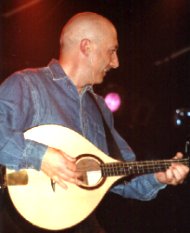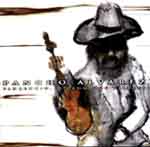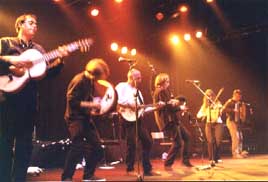FolkWorld article by Christian Moll:
Blind Fiddlers on the fairs
Pancho Alvarez revives this Galician tradition
Pancho Alvarez is one of the central figures of the traditional music revival is Galicia, northern Spain. In 1998 he released his first solo album called "Flocencio, O Cego Dos Villares". This album, voted by FolkWorld as the best album of 1998, is a very special one - Pancho recorded it in the spirit of Florencio, a blind musician, who played music on fairs for his living. This fascinating project was reason to have an interview with the outstanding musician Pancho Alvarez.
 First some words about Pancho's musical biographie: Pancho's first contact to music was his brother, a guitarist and bass player. Pancho is basically self taught; he spent some years in the conservatories, but he is not too happy with the work of them. He started his life as a professional musician in the influential Galician band Na Lua, having been a band member for 15 years. After that Pancho joined Carlos Núñez's band, and he has played together with Carlos for the last five years now.
First some words about Pancho's musical biographie: Pancho's first contact to music was his brother, a guitarist and bass player. Pancho is basically self taught; he spent some years in the conservatories, but he is not too happy with the work of them. He started his life as a professional musician in the influential Galician band Na Lua, having been a band member for 15 years. After that Pancho joined Carlos Núñez's band, and he has played together with Carlos for the last five years now.
The album "Flocencio, O Cego Dos Villares" of Pancho Alvarez is dedicated to the music of Florencio a blind fiddler and singer on the fairs of Galicia. Pancho says: "If Florencio would listen to the album, he would like the approach, I think. Because I have tried to make the album as faithful as possible, as close to the origin of Florencio's music."
In the booklet of the CD the Galician musician Xosé Lois Rivas writes about his memories and inspirations of the music
from the fairs:
"I was a child and adolescent during the fifties and sixties, and I remember hypocrisis as a social way in order to survive within the hostile society in which we lived. Those who spoke Castillian with some fluency were pretty and nice kids, those who spoke 'castrapo' (a combination of Castillian and Galician) were boorish and, above all, poorer. Radio and orchestra music was the best; bagpipes and songs by the peasent and the elderly were considered old fashioned and illiterate." (...)
"When I was about twenty I started to pick up music and tradition. I discovered that people had other ways of feeling. They spoke Galician when they did not refer to the children, it was immoral within a standard morallity, and they enjoyed themselves with bagpipes, poems and ballads. And when they sang in front of a recording machine they where touched by the value, that was beginning to be given to those aspects of life which had been ignored and rejected during the heavy years of franquism and national-Catholicism."
 "But a musical expression with peforative connection still existed: the singing of the blind. However it was part of the theatre world. Songs without social recognition. Funny enough..., almost everybody knew this songs by heart, up to fifteen, twenty or even more verses."
"But a musical expression with peforative connection still existed: the singing of the blind. However it was part of the theatre world. Songs without social recognition. Funny enough..., almost everybody knew this songs by heart, up to fifteen, twenty or even more verses."
"My head was used to the contradictions of my country, but this last one was exaggerated. I dealed with some blind that has practised singing in fairs and pilgrimage, and I learned to appreciate their 'castrapo', their bare poetry, although deep and full of popular understanding, the other culture, the other life, and above all, the melodies, the semi-guttural songs, the art of attracting and keeping the attention of the people who sang and played the violin, with their grace notes and mordents with Baroque scent, of exhibition, the spreading of famous events, the exaggeration of the lyrics." (...)
"Pancho has chosen the last high-quality blind I have heard about: Mr. Florencio, as an example and insporation for his record. Like always, there will be people to critices it, but I will not be one of them. Two talented artists have participated in Pancho's work. One is traditional: Florecio, and the other modern: Pancho. I find the combination pleasant and correct. Each of them gives what they have, which is how it should be. (...)"
These memories of Xosé Lois Rivas give a fair impression of the traditions featured in Panchos project.
 The blinds in those days where depending on the life as a musician. Explains Pancho: "The blind people were unable to do other things, because there wasn't any social security, the only option for them was the music. In Portugal, for instance, you still see blind people playing in the streets; there is still this tradition."
The blinds in those days where depending on the life as a musician. Explains Pancho: "The blind people were unable to do other things, because there wasn't any social security, the only option for them was the music. In Portugal, for instance, you still see blind people playing in the streets; there is still this tradition."
But often playing music on the fairs was not the free decision of the people, they would have prefered to have a system of life which is more dignified. "Today in Spain there are Blind People's organisation, the blinds can do other kind of jobs. So it is not that they liked the music itself that much in those days, but it was the only thing they had."
They were travelling musicians and this influenced their way of life a lot. "Their way of life was what we call in Spanish 'pícaro' (roguish; sly) - they had to be very fast and clever to survive. So they were aware if the people want to listen to and they knew what the people wanted to listen to; they were very clever, very aware of the reality and their surroundings..."
The blinds played traditional music for dance, and they sang a lot of songs. Mostly the blinds on the fairs played solo, but there are also photos where several fiddlers and tambourines can be seen.
 People with a better education than the traditional musicians wrote down the lyrics of the songs - without this it would be hard to find any traditional lyrics. "One of the most common kinds of songs were the Romances; Romances are like ballads with a story, a true story. The stories were about murders, human relationships, love and strange love. What the media would cover today, they covered with their stories. The very roots were the people, that's what everyday people wanted to listen to. Many times stories were connected to the life of the people, like a crime or murder that happened in the village near to the place where the blind was playing."
People with a better education than the traditional musicians wrote down the lyrics of the songs - without this it would be hard to find any traditional lyrics. "One of the most common kinds of songs were the Romances; Romances are like ballads with a story, a true story. The stories were about murders, human relationships, love and strange love. What the media would cover today, they covered with their stories. The very roots were the people, that's what everyday people wanted to listen to. Many times stories were connected to the life of the people, like a crime or murder that happened in the village near to the place where the blind was playing."
The tradition of the music of the blind probably comes from the tradition of the troubadour music, ot is probably a continuation of the music that was played in the middle ages, as it can be found all over Europe.
"This blind guy - Flocencio - was the last one, and it is the only one that they have recorded. There were lots of blind musicians on the fairs, but this was the only one they have recorded. So it's the only reference we have. Together with this recording there is also a course book, which is not a typical Romantic collection, it is well done and well reflected. The tapes recorded of Florencio accompany the actual books."
"The style of the fiddle - it sounds in our ears a bit Arabic, a bit like in Eastern Europe. It's very wild, it's a bit like when you listen to the travellers in England and Scotland; it's very fiery." When Sean Keane of the Chieftains listened to the recording of Florecio it reminded him of the old style in Clare.
 On the excellent album Pancho plays all the music himself - he is an excellent multiinstrumentalist. When you listen to the album you would never think that one person has played all the music, the album sounds very much like an brilliant band project.
Because of the good reactions on his album Pancho decided to form a band to be able to present the music of Florencio also in live. His band gathers some excellent musicians of Galicia: Pancho Alvarez (vocals, fiddle), Xuxo Núņez (percussion), Miguel Seoane (guitar), Félix Castro (gaita - the galician bagpipe, concertina, flute), Cástor Castro (bouzouki, flute) and Alvaro Iglesias (contrabass).
On the excellent album Pancho plays all the music himself - he is an excellent multiinstrumentalist. When you listen to the album you would never think that one person has played all the music, the album sounds very much like an brilliant band project.
Because of the good reactions on his album Pancho decided to form a band to be able to present the music of Florencio also in live. His band gathers some excellent musicians of Galicia: Pancho Alvarez (vocals, fiddle), Xuxo Núņez (percussion), Miguel Seoane (guitar), Félix Castro (gaita - the galician bagpipe, concertina, flute), Cástor Castro (bouzouki, flute) and Alvaro Iglesias (contrabass).
If you don't have the chance to see the Pancho Alvarez Band in live, listen to Pancho's album, it is worth it!
This interview was done with Fernando Conde as translator - thanks Fernando!
Latest published CD: Pancho Alvarez "Flocencio, O Cego Dos Villares", DoFol
Photo Credit:
(1) & (3) Pancho Alvarez; (5) Carlos Núñez Banda with Pancho (third from left); photos by the Mollis.
(2) & (4) show the CD cover of Pancho's Cd, with a painting of Florencio
Back to the content of FolkWorld Articles & live reviews
To the content of FolkWorld online magazine Nr. 12
© The Mollis - Editors of FolkWorld; Published 12/99
All material published in FolkWorld is © The Author via FolkWorld. Storage for private use is allowed and welcome. Reviews and extracts of up to 200 words may be freely quoted and reproduced, if source and author are acknowledged. For any other reproduction please ask the Editors for permission.
FolkWorld - Home of European Music

Layout & Idea of FolkWorld © The Mollis - Editors of FolkWorld
 First some words about Pancho's musical biographie: Pancho's first contact to music was his brother, a guitarist and bass player. Pancho is basically self taught; he spent some years in the conservatories, but he is not too happy with the work of them. He started his life as a professional musician in the influential Galician band Na Lua, having been a band member for 15 years. After that Pancho joined Carlos Núñez's band, and he has played together with Carlos for the last five years now.
First some words about Pancho's musical biographie: Pancho's first contact to music was his brother, a guitarist and bass player. Pancho is basically self taught; he spent some years in the conservatories, but he is not too happy with the work of them. He started his life as a professional musician in the influential Galician band Na Lua, having been a band member for 15 years. After that Pancho joined Carlos Núñez's band, and he has played together with Carlos for the last five years now. "But a musical expression with peforative connection still existed: the singing of the blind. However it was part of the theatre world. Songs without social recognition. Funny enough..., almost everybody knew this songs by heart, up to fifteen, twenty or even more verses."
"But a musical expression with peforative connection still existed: the singing of the blind. However it was part of the theatre world. Songs without social recognition. Funny enough..., almost everybody knew this songs by heart, up to fifteen, twenty or even more verses." On the excellent album Pancho plays all the music himself - he is an excellent multiinstrumentalist. When you listen to the album you would never think that one person has played all the music, the album sounds very much like an brilliant band project.
Because of the good reactions on his album Pancho decided to form a band to be able to present the music of Florencio also in live. His band gathers some excellent musicians of Galicia: Pancho Alvarez (vocals, fiddle), Xuxo Núņez (percussion), Miguel Seoane (guitar), Félix Castro (gaita - the galician bagpipe, concertina, flute), Cástor Castro (bouzouki, flute) and Alvaro Iglesias (contrabass).
On the excellent album Pancho plays all the music himself - he is an excellent multiinstrumentalist. When you listen to the album you would never think that one person has played all the music, the album sounds very much like an brilliant band project.
Because of the good reactions on his album Pancho decided to form a band to be able to present the music of Florencio also in live. His band gathers some excellent musicians of Galicia: Pancho Alvarez (vocals, fiddle), Xuxo Núņez (percussion), Miguel Seoane (guitar), Félix Castro (gaita - the galician bagpipe, concertina, flute), Cástor Castro (bouzouki, flute) and Alvaro Iglesias (contrabass).